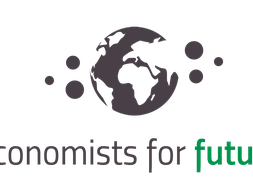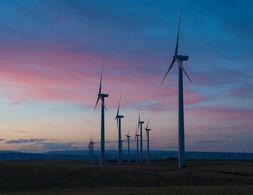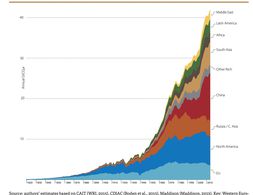199 Ergebnisse
This is an introductory level core course in macroeconomics for those expecting to take further courses in economics. It provides a theoretical and applied approach of introductory macroeconomics, with an international perspective and applications to account for the growing importance of the global economy and the rising openness of economies.
Der Fokus der Neoklassik liegt auf dem Umgang mit knappen Ressourcen. Analysen beschäftigen sich mit der effizienten Allokation von Ressourcen, um den Wohlstand zu vermehren.
This text summarizes the content of the 2018 Nobel Prize winner W. Nordhaus. It is extended by some critical perspectives on this topic. The short dossier gives an overview of the most important texts we have read in the climate economics reading group.
Gemäß der „vorsorgeorientierten Postwachstumsposition“ ist es ungewiss, wie sich die Wirtschaftsleistung entwickeln wird, wenn die Wirtschaftsweise in den wohlhabenden Ländern im Einklang mit globalen ökologischen Zielen grundlegend verändert wird. Andererseits spielen aufgrund der heutigen Verfasstheit der früh industrialisierten, wohlhabenden Länder die Wirtschaftsleistung und die damit generierten Einkommen eine wichtige Rolle. Daraus lässt sich das Ziel ableiten, diese gesellschaftlichen Institutionen nach Möglichkeit vorsorglich so zu transformieren, dass sie ihre Funktionen unabhängig(er) von der Wirtschaftsleistung erbringen können. Dies würde der Politik auch größere Spielräume bei Konflikten zwischen ökonomischen und ökologischen Zielen ermöglichen.
Economist and 2020 Balzan Prize winner for Environmental Challenges: Responses from the Social Sciences and Humanities, Joan Martínez Alier, speaks on the importance of ecological economics and its timeliness around the 2007/2008 global financial crisis. He speaks on the importance of building the field of ecological economics “from the ground up” through praxis.
The podcast exposes the concept and principles of co-operatives and the three main types of co-operatives: the consumer, credit and farmers buying and selling co-operatives. Furthermore, the history of the co-operative movement is presented. The authors draw the line from co-operatives to "degrowth" by arguing that these organisations discourage profit maximisation due to their ownership structure, their social purpose and their primacy of people over capital. The value of the members' co-operative share does not increase with the growth of a co-operative and it can not be used for speculation. Finally, the authors give examples for current co-operatives which empower (local) communities fostering social justice and environmentalism.
In this article, Gareth Dale analyzes and compares the main characteristics and differences of two visions that are currently emerging to tackle Climate Change: the Green New Deal and Degrowth. Which are the consequences from the environmental, economic and political point of view? And what are the underlying doctrines?
Andrew McAfee about the history of human progress and the modern uncoupling of our prosperity from resource consumption. They discuss the pitfalls and hidden virtues of capitalism, technological progress, environmental policy, the future of the developing world, and other topics.
Could working less make people and the planet better off? Find out in this dossier by exploring the landscape of working time reduction policies and their potential for reimagining, restructuring, and redistributing time as a political resource in the 21st century economy.
In this essay, Professor Robert Pollin explores the short falls of the degrowth perspective in handling the impending environmental collapse as well as elaborates on the efficacies of a green new deal.
This course provides future change makers in public and private sectors with a comprehensive overview on the structures and actors that shape markets.
This collection of videos offers a short introduction to ecological economics and its main differences with respect to environmental economics.
The British historian, Adam Tooze, highlights how the climate crisis is not just an environmental or ecological problem but also a political economy challenge.
A review of:
[1] Intermediate Microeconomics, H.R. Varian
[2] Mikrooekonomie, R.S. Pindyck, D.L. Rubinfeld
[3] Grundzuege der mikrooekonomischen Theorie, J. Schumann, U. Meyer, W. Stroebele
The goal of the class is to acquire familiarity with recently-published research in alternative macroeconomics with a focus on the distribution of income and wealth, cyclical growth models, and technical change.
Aim of this intensive workshop is to understand macroeconomic workings of climate change as as the background of sustainable finance; to analyse financial assets with ESG (Environmental, Social and Governance) criteria attached to them and their markets and important institutional players; to develop a critical perspective on the current setup of sustainable finance; and to synthesise this knowledge by applying it on in-depth case studies.
Is degrowth bad economics To properly answer this question it is essential to understand what economic growth really is The term growth is often associated with an increase in wealth a term loosely defined but according to the degrowth movement economic growth is a narrower concept only describing an increase …
Sporting events can be seen as controlled, real-world, miniature laboratory environments, approaching the idea of “holding other things equal” when exploring the implications of decisions, incentives, and constraints in a competitive setting (Goff and Tollison 1990, Torgler 2009). Thus, a growing number of studies have used sports data to study decision-making questions that have guided behavioral economics literature.
Aim of this intensive workshop is 1.) to introduce the participants to the macroeconomic workings of the climate crisis as the background of sustainable finance; 2.) to introduce financial assets with ESG (Environmental, Social and Governance) criteria attached to them and their markets and important institutional players; 3.) to provide a critical perspective on the current setup of sustainable finance; 4.) and to work on in-depth case studies illustrating the workings on ESG-finance markets, its emitters and traders as well as their macroeconomic implications.
It is perhaps fitting that the seriousness of the coronavirus threat hit most of the Western world around the Ides of March, the traditional day of reckoning of outstanding debts in Ancient Rome. After all, problems and imbalances have accumulated in the Western capitalist system over four decades, ostensibly since it took the neoliberal road out of the 1970s crisis and kept going along it, heedless of the crises and problems it led to.
Ecological economics explores new ways of thinking about how we manage our lives and our planet to achieve a sustainable, equitable, and prosperous future. Ecological economics extends and integrates the study and management of both "nature's household" and "humankind's household"—An Introduction to Ecological Economics, Second Edition, the first update and expansion of this classic text in 15 years, describes new approaches to achieving a sustainable and desirable human presence on Earth.
Diane Perrons and Sigrid Stagl combine feminist and critical environmental economics perspectives to develop a critique of the free market growth model and offer new ideas for a more sustainable gender equitable model of development in the interests of all.
How do people make decisions? There is a class of models in psychology which seek to answer this question but have received scant attention in economics despite some clear empirical successes. In a previous post I discussed one of these, Decision by Sampling, and this post will look at another: the so-called Fast and Frugal heuristics pioneered by the German psychologist Gerd Gigerenzer. Here the individual seeks out sufficient information to make a reasonable decision. They are ‘fast’ because they do not require massive computational effort to make a decision so can be done in seconds, and they are ‘frugal’ because they use as little information as possible to make the decision effectively.
The core of Georgism is a policy known as the Land Value Tax (LVT), a policy which Georgists claim will solve many of society and the economy’s ills. Georgism is an interesting school of thought because it has the twin properties that (1) despite a cult following, few people in either mainstream or (non-Georgist) heterodox economics pay it much heed; (2) despite not paying it much heed, both mainstream and heterodox economists largely tend to agree with Georgists. I will focus on the potential benefits Georgists argue an LVT will bring and see if they are borne out empirically. But I will begin by giving a nod to the compelling theoretical and ethical dimensions of George’s analysis, which are impossible to ignore.
Thinking in Systems, is a concise and crucial book offering insight for problem solving on scales ranging from the personal to the global. Edited by the Sustainability Institute's Diana Wright, this essential primer brings systems thinking out of the realm of computers and equations and into the tangible world, showing readers how to develop the systems-thinking skills that thought leaders across the globe consider critical for 21st-century life.
Work defines who we are It determines our status and dictates how where and with whom we spend most of our time It mediates our self worth and molds our values But are we hard wired to work as hard as we do Did our Stone Age ancestors also live …
How countries achieve long-term GDP growth is up there with the most important topics in economics. As Nobel Laureate Robert Lucas put it “the consequences for human welfare involved in questions like these are simply staggering: once one starts to think about them, it is hard to think about anything else.” Ricardo Hausmann et al take a refreshing approach to this question in their Atlas of Economic Complexity. They argue a country’s growth depends on the complexity of its economy: it must have a diverse economy which produces a wide variety of products, including ones that cannot be produced much elsewhere. The Atlas goes into detail on exactly what complexity means, how it fits the data, and what this implies for development. Below I will offer a summary of their arguments, including some cool data visualisations.
Economic sociology is an entire subfield and one could write an series on it, so I’m going to stick to probably the most prominent economic sociologist and the founder of ‘new economic sociology’, Mark Granovetter.
Eco-modernisation’s promise that technological fixes will provide us with the efficiency we need to decouple environmental burdens from economic growth suggests that business-as-usual can continue. Today’s guest Timothée Parrique is the best to explain why this is not happening and why relying solely on technological solutions is like betting on green zero in roulette.
In the history of the social sciences, few individuals have exerted as much influence as has Jeremy Bentham. His attempt to become “the Newton of morals” has left a marked impression upon the methodology and form of analysis that social sciences like economics and political science have chosen as modus operandi.
Diese Lehrveranstaltung ist eine Einführung in die Medienökonomik, in deren Zentrum das komplexe Verhältnis von Ökonomie und Massenmedien steht, welches besonders in Zeiten eines rasanten Medienwandels noch einmal von größerer Bedeutung ist.
Maria Nikolaidi on how Minsky’s theory has been modelled over past decades and how one can use these models in order to analyse contemporary issues such as financial fragility and financial instability caused by climate change.
Wir nutzen Cookies. Klicke auf "Akzeptieren" um uns dabei zu helfen, Exploring Economics immer besser zu machen!


























